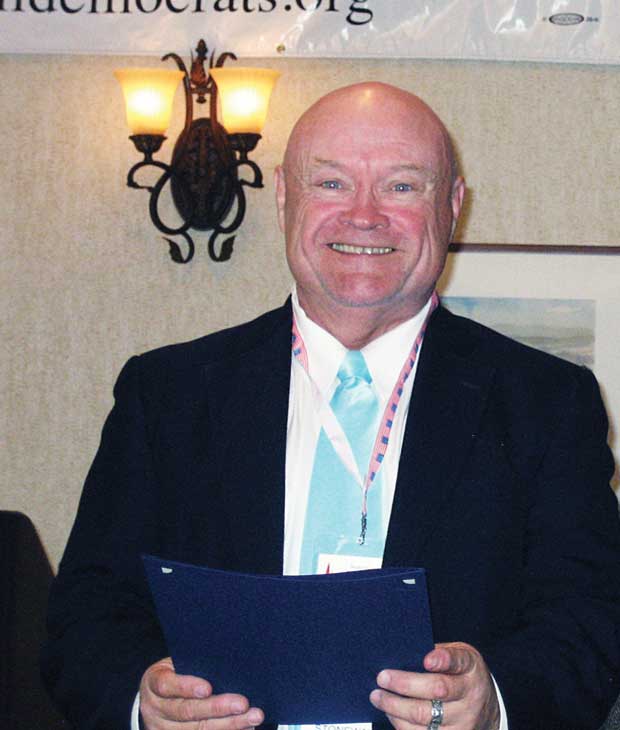Party leaders opt against placing nonbinding resolution on primary ballot
JOHN WRIGHT | Senior Political Writer
wright@dallasvoice.com
AUSTIN — Democrats in Texas won’t get to vote next year on whether they support same-sex marriage, after the party’s Executive Committee shot down a proposal to place a non-binding resolution on the March 2012 primary ballot.
Meeting in the capital on Saturday, Nov. 19, the State Democratic Executive Committee voted 33-22 against placing the resolution in support of same-sex marriage on the ballot, according to Dan Graney, president of the party’s LGBT caucus.
The resolution, backed by the Texas Stonewall Democratic Caucus, called for same-sex couples to receive “equal access to civil marriage and all its benefits,” and stated that “all state and federal laws denying such access should be repealed.”
In addition to gauging support for marriage equality among Democrats in Texas, the resolution was designed to boost interest and turnout in the primary, especially among young voters, given that President Barack Obama is running unopposed, Graney said.
However, some SDEC members feared backlash from the marriage resolution and said it could be used against Democratic candidates by their Republican opponents, Graney said.
“Unfortunately, many SDEC members are afraid to let Democratic voters have their say on issues they regard as too controversial,” Graney said after the SDEC’s vote. “Polling data shows that legal recognition of same-sex relationships is now supported by 63 percent of all Texans, so I don’t understand the fear about allowing voters to weigh in on this.”
Some openly LGBT members of the SDEC argued passionately in favor of the marriage resolution, Graney said. However, two openly gay SDEC members — both from Tarrant County — opposed it.
SDEC member DeeJay Johannessen, former president of Stonewall Democrats of Tarrant County, said he voted against placing the resolution on the ballot because he didn’t think it would accomplish the stated purpose of increasing voter turnout. Johannessen said valuable resources would have been spent trying to get the resolution passed, even though it would have no practical impact.
Johannessen was joined in voting against the resolution by openly gay Tarrant County SDEC member Mary Edwards.
“My thoughts are that we should be dealing with issues about jobs and education and the economy,” Johannessen said. “We need to be focused on issues where we can affect change.
“It wasn’t about marriage equality,” he said of his vote. “It was about whether or not putting this on the ballot would bring more people out to vote, and I didn’t think that would happen.”
Graney said he feels the majority of SDEC members support same-sex marriage. But he said a majority, like Johannessen, opposed the measure for strategic reasons.
The state Republican Party has placed resolutions on primary ballots in at least the last two election cycles, but Democrats have not, Graney said.
Other resolutions voted on by the SDEC last weekend called for abolishing the death penalty, legalizing marijuana, passing the DREAM Act, mandating affordable college tuition and legalizing casino gambling.
The SDEC approved the resolutions related to the DREAM Act, college tuition and casino gambling, and they will appear on the March 6 primary ballot.
Graney noted that the marriage resolution received more support than those calling for abolishing the death penalty and legalizing marijuana, which got only 14 and 12 votes, respectively.
He also commended Texas Democratic Party Chairman Boyd Richie and Resolutions Committee Chairman Dennis Teal for allowing the full SDEC to consider the marriage resolution even though the committee voted against it.
“We had a 45-minute discussion and debate on the issue,” Graney said. “They could have squashed it, but they didn’t.”
Although their votes drew attention because they’re openly gay, Johannessen and Edwards weren’t the only SDEC members from North Texas who opposed the resolution.
In fact, only one of six SDEC members from Dallas County — Theresa Daniel — voted in favor of placing the marriage resolution on the ballot, according to Omar Narvaez, president of Stonewall Democrats of Dallas.
Daniel, a straight LGBT ally and Stonewall member, is running for the Precinct 1 seat on the Dallas County Commissioners Court in 2012.
Erin Moore of Dallas, vice president of the Texas Stonewall Democratic Caucus, is a non-voting SDEC member and spoke in support of the marriage resolution during Saturday’s meeting.
“We just thought this was the perfect opportunity to get the pulse of the electorate again,” Moore said of the resolution.
Regardless of whether the resolution appears on the ballot, Moore said, Republicans will try to attack Democrats over gay rights, and voters will ask candidates about their views on same-sex marriage.
Moore said she thinks the SDEC’s vote against placing the resolution on the ballot amounted to Democrats “running scared instead of running strong.”
“They’re scared of losing what we’ve got, which is very little,” she said.
The tally was based on a headcount of SDEC members who stood up, and there is no written record of how each person voted. But both Moore and Graney recalled a clear demographic split over the marriage equality resolution.
They said most members who opposed the resolution were older white males, and they called for the party to respond by electing more progressives and minorities to the SDEC next year.
“The SDEC needs to look like Texas is now, not like Texas was,” Moore said.
Chuck Smith, deputy director of Equality Texas, said he also would have liked to see the resolution on the ballot.
Smith said opponents of LGBT equality frequently point to results from 2005, when three-fourths of Texas voters supported a constitutional amendment banning both same-sex marriage and civil unions.
“We would like to see every candidate for every office asked where they stand on marriage equality,” Smith said. “It’s a subject we need to talk about, and the more we talk about it, the more we’re going to find how significantly the numbers have changed since six years ago.”
This article appeared in the Dallas Voice print edition November 25, 2011.
















While most of the GLBT community is focused on Marriage Equality and DOMA – personally I think that ENDA, the Employment Non-Discrimination Act – is vastly more important to the Community. Marriage and the concomitant rights that come with it are great and I’m all for that of course – but having the right to “marry” your partner if you are unemployed with no income means very little. Today, all over America, GLBT people can be fired just for being GLBT and that’s wrong. I wish our Community would fight as hard for ENDA as they seem to want to do for Marriage. In today’s very competitive economy – a good paying job should be of primary concern to our Community in my humble opinion.
@Jay: As far as I know, the SDEC did not put ENDA on the ballot, either.
Jay I agree I just don’t know why we can’t put as much energy behind both. Both are important.
Sadly there is not enough votes in congress to pass it. My side (dems) are not all behind it either. I know some think the pres can just sign something and put it in place but that’s not how it works. Congress makes laws the pres inforces them. ENDA is vital for everyone but is going to be just as hard to get through as marriage is. Sucks
Freaking cowards. And just hours ago here on the pages of DV, we read about that Waxahatchie gal who was fired from her job for “working while lesbian”. It just sickens me.
This isn’t strategic, it is cowardly. Principals should rule politics, not fear.
Ray
Your not going to get ENDA from TX, it needs to come from the us government, TX won’t pass it even if dems scream it, and I’m sure you know that
ENDA won’t pass here in the near term, but an ENDA resolution might help drive voter turnout. It could also help us to educate Texans. Most people don’t realize that you can be legally fired in Texas for being gay.
Point taken Matt
A few things: Prioritization of rights (ENDA trumps DOMA repeal.. blah blah blah) is insulting to anyone who really regards themselves as a free and equal person. In other words “How dare you tell me that certain civil rights are more important than others.” Injustice is injustice is injustice- plain and simple. I represent a growing LGBT population that is weary of this piecemeal, back burner approach to gaining our rights.
“My thoughts are that we should be dealing with issues about jobs and education and the economy,” – This is a cop out and not even a good one. I will let the words of Harvey Milk sum this one up- “It takes no compromising to give people their rights, it takes no money to respect the individual, it takes no survey to remove repressions.”
What we are seeing is simply cowardice. The Democrats want our votes..they constantly remind us just how terrible the alternative would be.. well NEWS FLASH.. if they aren’t even willing to SAY they support us, they are helping fuel the fires of bigotry. Remaining on neutral ground ALWAYS helps the oppressor, NEVER the oppressed.
So dems.. you want my vote? Make good on your commitment to this community or take a hike.. I would rather sit out the damn election.